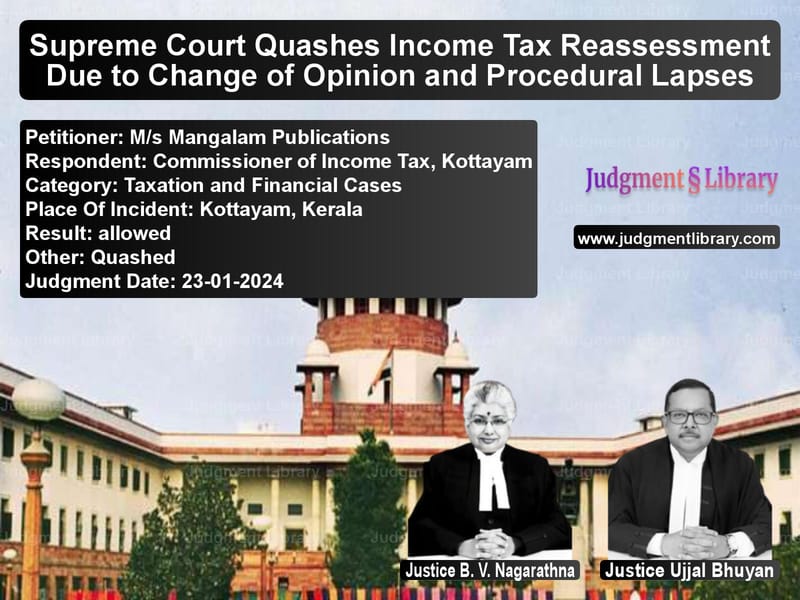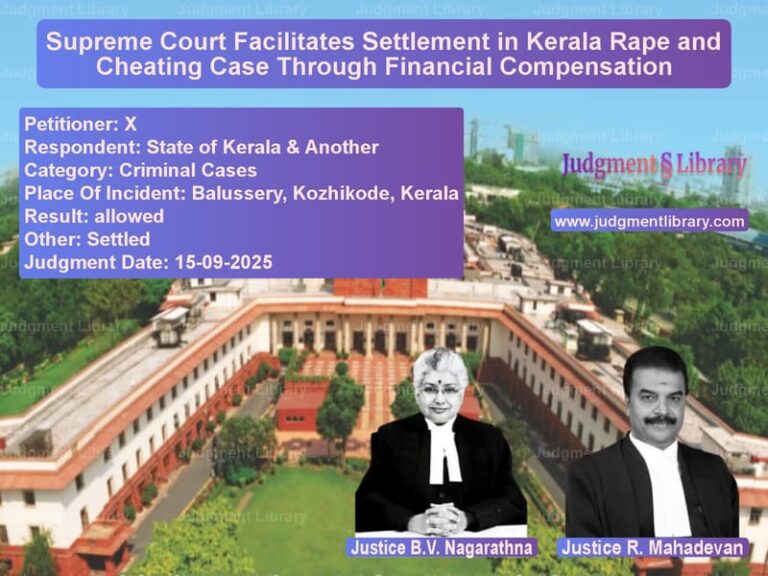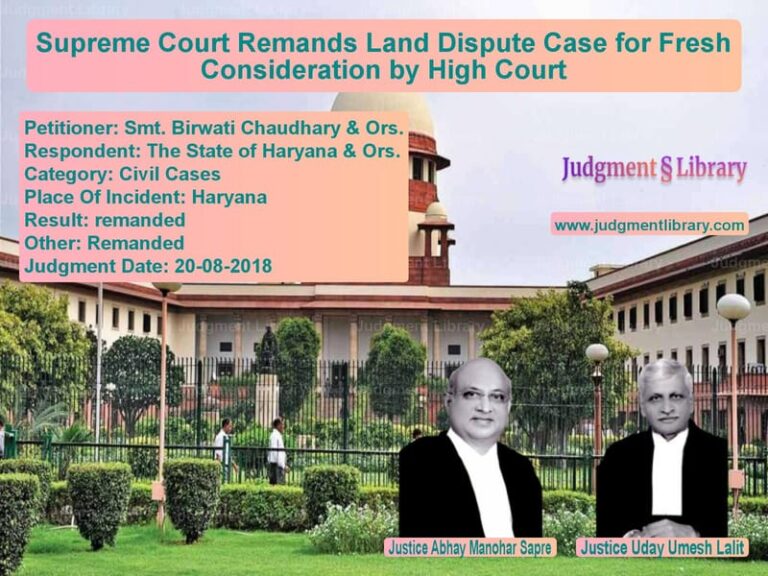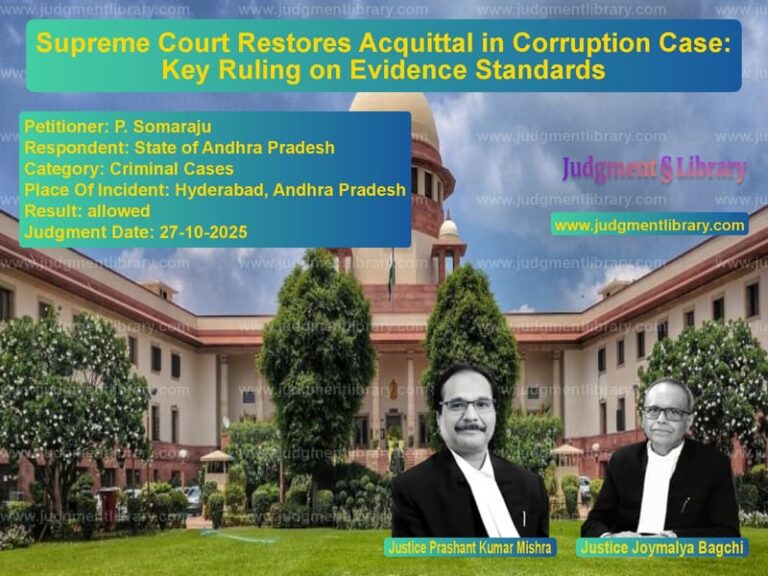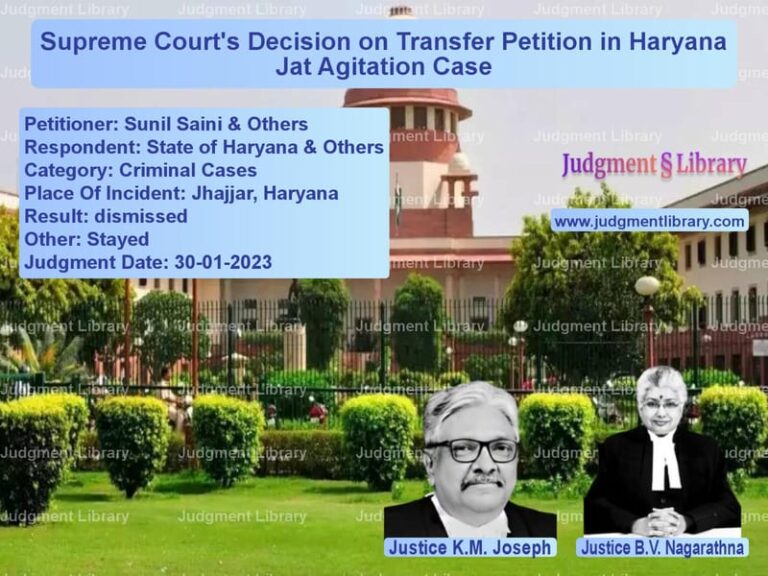Supreme Court Quashes Income Tax Reassessment Due to Change of Opinion and Procedural Lapses
The Supreme Court of India has delivered a landmark ruling in favor of M/s Mangalam Publications, setting aside reassessment orders issued by the Income Tax Department under Section 147 of the Income Tax Act, 1961. The judgment reinforces the principle that reassessment cannot be initiated merely on a change of opinion and that the Income Tax Department must have tangible material evidence to reopen an assessment. The Court also emphasized the importance of adhering to statutory limitation periods, ensuring that taxpayers are not subjected to arbitrary and prolonged scrutiny.
Background of the Case
M/s Mangalam Publications, a well-established publishing house based in Kottayam, Kerala, filed its income tax returns for the assessment years 1990-91, 1991-92, and 1992-93. The company’s returns were scrutinized under Section 143(3) of the Income Tax Act, and assessments were completed accordingly. However, in March 2000, the Income Tax Department issued reassessment notices under Section 148, claiming that there was an unexplained increase in the firm’s capital accounts between 1985 and 1993. The Department alleged that the taxpayer had underreported income and failed to disclose material facts necessary for assessment.
The petitioner challenged these reassessment notices before the Income Tax Appellate Tribunal (ITAT), which ruled in its favor, quashing the reassessment orders. However, the Kerala High Court reversed the ITAT’s decision, prompting M/s Mangalam Publications to approach the Supreme Court.
Petitioners’ Arguments
The petitioner, represented by senior counsel, argued the following points:
- The original assessments were completed under Section 143(3) based on full and true disclosure of all material facts.
- The reassessment was initiated merely on a change of opinion and not on any fresh evidence, which is impermissible under Section 147.
- The reassessment proceedings were time-barred as the notices under Section 148 were issued beyond the four-year limitation period prescribed under the Income Tax Act.
- The alleged unexplained income was derived from financial records that had already been scrutinized in previous assessments.
- Procedural lapses in initiating the reassessment rendered the entire process invalid.
Respondents’ Arguments
The Income Tax Department defended its reassessment orders on the following grounds:
- The reassessment was necessary due to a substantial increase in the capital accounts of the taxpayer, which required further scrutiny.
- The taxpayer had failed to disclose all necessary financial details at the time of the original assessment.
- The High Court correctly held that the taxpayer had not fully and truly disclosed all material facts required for assessment.
- The limitation period should be computed from the date on which the department discovered discrepancies, not from the original assessment date.
Supreme Court’s Analysis and Ruling
The Supreme Court meticulously examined the case, focusing on the validity of the reassessment notices and the procedural lapses committed by the Income Tax Department. The Court made the following key observations:
1. Reassessment Cannot Be Based on a Change of Opinion
The Court reiterated that the principle of reassessment under Section 147 of the Income Tax Act does not permit reopening of assessments based merely on a change of opinion. The Court cited its earlier ruling in Commissioner of Income Tax v. Kelvinator of India Ltd. (2010), which held:
“An assessing officer acquires jurisdiction to reopen an assessment only if new, specific, reliable, and relevant information surfaces. A reassessment that merely reassesses existing facts is impermissible.”
2. Absence of Fresh Material Evidence
The Court found that the Income Tax Department had not presented any new tangible material to justify reassessment. The alleged income increase was based on financial records that had already been reviewed in the original assessment.
3. Violation of the Limitation Period
The Court noted that reassessment proceedings must adhere strictly to statutory deadlines. In this case, the department had issued notices under Section 148 after the four-year limitation period, making the reassessment proceedings legally untenable.
4. Procedural Lapses by the Income Tax Department
The Court observed that the reassessment notices did not follow proper legal procedures. The department failed to provide a valid reason for reopening the case beyond the limitation period, violating the principles of procedural fairness.
Final Judgment
In light of these findings, the Supreme Court ruled in favor of M/s Mangalam Publications, setting aside the High Court’s decision and restoring the ITAT’s ruling. The Court held:
“Reassessment proceedings cannot be initiated arbitrarily, nor can they be based on a change of opinion. The Income Tax Department must adhere to statutory limitations and procedural fairness while exercising its powers under Section 147.”
Key Takeaways from the Judgment
- Reassessment Requires New Material: Tax authorities cannot reopen assessments without fresh, tangible evidence.
- Change of Opinion Not a Valid Ground: The judgment safeguards taxpayers from arbitrary reassessment based on an assessing officer’s reinterpretation of previously reviewed facts.
- Limitation Period Enforcement: Reassessment proceedings must strictly adhere to statutory deadlines to prevent undue harassment of taxpayers.
- Procedural Fairness: The Income Tax Department must follow due process, ensuring that taxpayers are given fair notice and valid reasons for reassessment.
Impact of the Judgment
The ruling provides significant relief to taxpayers, preventing arbitrary reassessments and reinforcing the need for procedural fairness in tax proceedings. The key implications include:
- Ensuring that reassessment proceedings are not misused as a tool for prolonged litigation.
- Strengthening taxpayer confidence in the judicial system’s ability to check arbitrary actions by tax authorities.
- Encouraging the Income Tax Department to adopt transparent and legally sound methods in conducting assessments.
Conclusion
The Supreme Court’s decision in M/s Mangalam Publications v. Commissioner of Income Tax reinforces the principle that reassessment must be based on new, tangible evidence rather than a change of opinion. By quashing the reassessment orders, the Court has upheld the rights of taxpayers and ensured that tax assessments remain fair, transparent, and legally sound. This ruling sets a precedent for future cases involving income tax reassessments, strengthening the protection against arbitrary and prolonged tax scrutiny.
Petitioner Name: M/s Mangalam Publications.Respondent Name: Commissioner of Income Tax, Kottayam.Judgment By: Justice B. V. Nagarathna, Justice Ujjal Bhuyan.Place Of Incident: Kottayam, Kerala.Judgment Date: 23-01-2024.
Don’t miss out on the full details! Download the complete judgment in PDF format below and gain valuable insights instantly!
Download Judgment: ms-mangalam-publica-vs-commissioner-of-inco-supreme-court-of-india-judgment-dated-23-01-2024.pdf
Directly Download Judgment: Directly download this Judgment
See all petitions in Income Tax Disputes
See all petitions in Tax Evasion Cases
See all petitions in Tax Refund Disputes
See all petitions in Judgment by B.V. Nagarathna
See all petitions in Judgment by Ujjal Bhuyan
See all petitions in allowed
See all petitions in Quashed
See all petitions in supreme court of India judgments January 2024
See all petitions in 2024 judgments
See all posts in Taxation and Financial Cases Category
See all allowed petitions in Taxation and Financial Cases Category
See all Dismissed petitions in Taxation and Financial Cases Category
See all partially allowed petitions in Taxation and Financial Cases Category

